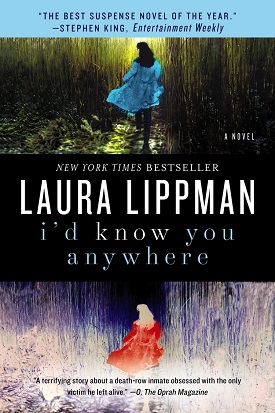 Synopsis:
Synopsis:
Eliza Benedict has found happiness in her marriage to Peter, and as a mother to daughter Isobel and son Albie. Recently, the Benedict family has returned to the U.S. after living in England for several years. Peter, a journalist, has sequed into a financial career, and the family is settling into its new home, not far from where Eliza grew up.
Eliza never sleeps with the windows open. She also carefully guards a secret that she does not want her children to learn about from someone else: She grew up as Elizabeth Lerner, but at fifteen years of age, she changed her name to Eliza when she was reunited with her parents and sister, Vonnie, after being kidnapped, raped, and held hostage for thirty-nine days. And Eliza has always wanted to know the answer to one question: Why was she allowed to live when her captor murdered all of his other victims?
Walter Bowman, the man who abducted, sexually assaulted, and murdered several other teen-age girls, but let Eliza live, is scheduled to be executed soon. Convicted for the deaths of two young girls named Maude and Holly, Walter, with the assistance of Barbara Lafortuny, a retired teacher who opposes the death penalty and has befriends inmates, has been searching for Elizabeth. He wants to see her and convince her to help him get his death sentence commuted to life in prison without the possibility of parole, in exchange for which he will reveal the names and locations of the graves of the other girls he killed.
Once Walter finds a photograph of Eliza, attending a social function with Peter, in a magazine, it isn’t difficult for Barbara to track down her new address. Walter’s first letter shocks and unnerves Eliza. In it, he claims he recognized her immediately upon seeing the photograph, despite her changed appearance, writing, “I’d know you anywhere.” Now Eliza must decide whether to agree to communicate with Walter, fearing that if she refuses, Barbara will assist him by revealing her identity to the media, thereby destroying the quiet, anonymous life she created for herself so many years ago.
Eliza wonders precisely what Walter wants from her, and at what price she might finally get an answer to the one question that has haunted her for so many years.
Review:

With I’d Know You Anywhere, Laura Lippman has crafted a taut, intriguing page-turner. Alternating between present day events and those that took place when Eliza was fifteen years old, Lippman expertly reveals salient details about Walter Bowman’s early years, as well as the day he decided to just keep driving and ended up becoming a murderer. Lippman also takes readers back to the carefree, yet angst-driven adolescence of Elizabeth Lerner, the teenager who emulated Madonna and wanted to hang out in the hip local spots with the cool kids from her school. Eventually, as the chapters progress, Walter and Elizabeth’s fates pull them closer and closer together, until Walter encounters her as he is burying another victim and decides that, because she has most likely seen and now knows too much, she must become his next one.
Curiously, however, Walter neither sexually assaults nor kills Elizabeth. Instead, she becomes his traveling companion and, as the two of them drive up and down the highway, sleeping in a tent or, occasionally, when Walter has worked an odd job or two and managed to scrape together a little money, in motels, he not only refrains from attempting to rape her, but also lets her live and be his traveling companion. Telling curious strangers that Elizabeth is his younger sister and their parents have died, entrusting her care to him, he convinces Elizabeth not to attempt to escape. If she does, he warns her, he will hurt her parents and sister. Still, Walter does sexually assault and murder two other girls while Elizabeth is his hostage.
Lippman deftly and subtly inspires her readers to ponder their feelings about many different topics, including but not limited to Stockholm syndrome. Psychiatrists recognize that, in order to survive the ordeal, hostages and victims of emotional, physical and/or sexual abuse often emotionally bond and sympathize with their captors as a means of coping with extreme duress. A captor’s small acts of kindness are seen are more meaningful than they really are, and opportunities to escape may be overlooked or bypassed due to the victim’s belief in either overt threats, such as Walter’s, or a perceived belief that, if caught, they or someone they love will be harmed. After he is arrested and Elizabeth is returned to her parents, she is forced to testify at Walter’s trial. Prosecutors, defense counsel, and the media all question why Elizabeth did not run away from Walter when presented with what they perceive, in hindsight, as chances she had to escape. Walter’s letter and the telephone calls Eliza subsequently agrees to accept from him cause her to not only re-live the events of that summer, but again question whether her critics were right. Could she have escaped from Walter, thereby saving at least two of his victims?
Interestingly, Lippman says that I’d Know You Anywhere is “a novel about intimacy . . . [W]hat does it mean to know someone? And when you know someone — when you absolutely understand what lies in another person’s heart — does that obligate you to that person just because you understand them when no one else does?” Eliza absolutely understands Walter after spending 39 days as his hostage. But does that mean that she is obligated to respond positively to his requests to speak and visit with him prior to his execution? Is she obligated to help him escape the death chamber?
I’d Know You Anywhere is based upon a real crime, but Lippman has refrained from discussing the actual case because it involved the sexual assault of a minor. In that case, however, a serial killer claimed several victims — except one. And that inspired Lippman to write I’d Know You Anywhere. She wondered, “What is it like to be that person?” Thus, throughout the story, Eliza struggles with her dueling and confusing emotions about being the only one of Walter’s victims to have survived. She is thankful for her life and the beautiful family with which she has been blessed. Still, survivor’s guilt is real, palpable, and has informed and inspired most of the decisions Eliza has made since surviving those thirty-nine days with Walter. Her guilt makes her curious about why Walter is reaching out to her now? Will that guilt also cause her to grant Walter’s requests?
Among the supporting characters to whose stories Lippman devotes whole chapters are Barbara LaFortuny, the retired school teacher who has devoted herself to helping inmates. Determined not to see Walter executed, she has agreed to help him find and communicate with Eliza. But what does Barbara stand to gain, given that she has never even been allowed to visit Walter?
The central question is: Why was Eliza allowed to live? And it’s a question that Eliza is not sure she should be asking. … [But] it’s natural for her to wonder if the answer is the missing piece of her personality, the thing that will finally set her free from her past.
~ Author Laura Lippman
And then there is Trudy Tackett, the mother of Walter’s final victim, Holly. Trudy lead a charmed life, blessed with wealth, an adoring husband, and beautiful children, including her only daughter. But her world was shattered when she lost her only daughter, and since Holly’s death, she has kept up the appearance of having carried on with her life, but harbors secrets about her health and lifestyle. Is she really living or just waiting to join her daughter in death? She purchased the outfit she planned to wear to Walter’s execution several years ago, and is still saving it for that occasion, despite his date with death having been postponed twice. And she has been made aware of Walter’s communication with Eliza. How brazen is Trudy and what is she really capable of doing in order to ensure that justice is served on behalf of her deceased child?
Walter has plainly changed during the years he has spent awaiting his execution. He has read extensively and improved his vocabulary. He would have Eliza believe that he does not deserve the death penalty. But is Walter telling the truth for the first time or is his behavior simply a ruse designed to attempt to have his sentence commuted to life without the possibility of parole?
Eliza must reassess her memories and feelings. Are her recollections of those days accurate? Or has the passage of time caused her to believe things transpired differently than they actually occurred? If she can do what Walter is asking of her, should she? And if she accedes to his request, what will be the cost to her and her family? If Walter is executed, will his death at last release Eliza from her memories and the fear she has lived with since she was robbed of her innocence all those years ago?
Lippman leaves her readers considering their opinion of the death penalty, as well. Are the ends of justice served by executing murderers? Or should criminals like Walter Bowman be sentenced to a lifetime of incarceration? Here in California, for instance, the death penalty debate rages on, as the courts consider whether revised procedures are Constitutionally sound, a brand-new death chamber has been constructed but never used, and nearly seven hundred men await their appointment in that chamber on San Quentin State Prison’s Condemned Row. No executions have taken place in California since January 2006, to the relief of many and consternation of others.
Never preachy, Lippman wisely leaves the questions she poses through her characters and their experiences unanswered, letting readers make up their own minds. Thus, I’d Know You Anywhere would make an excellent book club selection because of the number of discussion topics it inspires.
Also by Laura Lippman:
Stand-Alones
Tess Monaghan Novels












9 Comments
[New Post] Book Review: I’d Know You Anywhere https://www.jhsiess.com/2011/01/28/book-r…
This book is going to be a must read for me. It sounds such a fascinating book and the theme of capital punishment is something I am very interested in. Capital punishment has been stopped in our country and it is being debated again as there is a huge part of the population that wants it back. This is a very emotional issue here as well.
Sounds like a very interesting and thought provoking book. I like Laura Lippman. Why haven’t I read her lately? I’ll keep an eye out for this one.
great review, really thoughtful and interesting! I read and reviewed this book during the summer and also found it really great and it inspired me to read more my Lippman as well. I just read my second by her, but hopefully will have a chance to read another before the year is up, definitely a talented lady!
What a great review – this book sounds fascinating and I hope that I will ahve the chance to read it one day soon
Fantastic review…I read this book as well and loved it.
Pingback: Saturday Review of Books: January 29, 2011 | Semicolon
Pingback: The Mad Editor’s Round-Up #27 | Diary of a Mad Editor
Pingback: “I’d Know You Anywhere” by Laura Lippman | Melody & Words